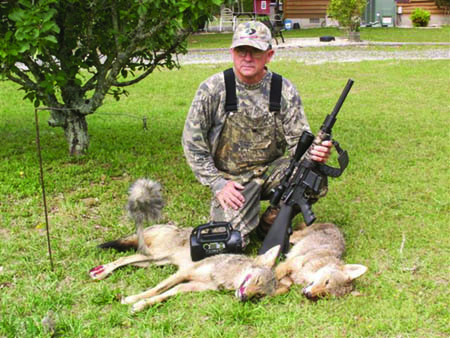 Since I have developed a reputation for calling predators, and because I often write about it, I get many calls regarding stock killers. The primary predators in my home area are bobcats, foxes, raccoons and coyotes. I have had occasion to deal with all four.
Since I have developed a reputation for calling predators, and because I often write about it, I get many calls regarding stock killers. The primary predators in my home area are bobcats, foxes, raccoons and coyotes. I have had occasion to deal with all four.
Bobcats: This feline is generally satisfied with birds, mice, squirrels and cottontail rabbits. When the food supply is good and the predator is healthy, there is no need for a bobcat to become a domestic problem. If food is in short supply, or if the predator is handicapped, then it is natural for the cat to gravitate toward easier pickings—such as helpless piglets.
Foxes: We all know the stories about the fox in the henhouse, and they are true. To the satisfaction of those with chickens, and displeasure of those of us who hunt predators, foxes are becoming less common. We can blame this on Wiley Coyote. Coyotes are devastating the red fox population in my neck of the woods and also reducing gray fox numbers.
Raccoons: It really doesn’t matter if the food supply is short or long, the raccoon is still going to raid domestic stock. This critter kills indiscriminately. In every raccoon case I was ever called to, there was evidence of this bandit killing more than it could possibly eat.
Coyotes: Those of us in the Southeast have dealt with cats, coons and foxes forever. Only for the last 15 years or so have we had a large number of coyotes. The population increases annually and although we haven’t scratched the surface of what we need to know about coyotes, each year we learn more about their habits. They are opportunistic feeders and they migrate to the better food sources. When I get a problem call from a cattle farmer I know he is going to have a significant number of yodel dogs.
1. When a problem occurs with a rogue, the best place to hunt it is at the place where the crimes were committed.
2. Generally, predator hunting is done a safe distance from homes but dealing with rogues is different. . Let the owner know it’s in your best interest – and his – to lock up the pets until the hunt is over.
3. Use your imagination when finding a place to make your stand. Look for elevated lofts, decks, or windows. Doing so not only puts you above the predator, it allows you to shoot directly into the ground.
4. There is no such thing as too much information. Learn all you can from the owner of the land.
5. Many states have regulations that set seasons for predators. If you have a rogue problem during the off-season, some wildlife management agencies will issue you a special permit or a Depredation Order. Know your local laws.
6. Some rogue problems occur in areas where it isn’t safe to use a centerfire rifle. If you must use a shotgun, know the maximum effective range.






